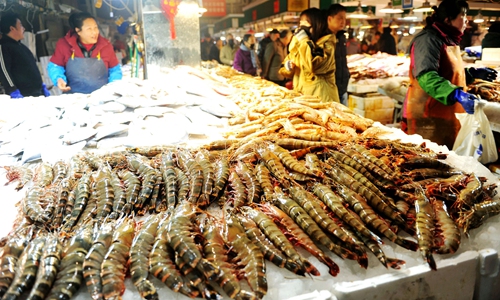HOME >> SOURCE
Coronavirus outbreak hits global seafood market as demand falls
By Shen Weiduo Source:Global Times Published: 2020/2/2 22:43:40

Seafood market at Qingdao, East China's Shandong Province on January 19 Photo: IC
They predicted that in the coming months, products ranging from Norway's salmon and Australia's rock lobsters to Dutch crabs could feel the impact of China's cancelled orders. Experts noted the impact could be temporary, and it will not affect the nation's long-term import structure.
"I've cancelled salmon orders from Norway, which was a hard decision since I have to pay default penalties, but it's better than wasting the fish as no customers are dining out now," Zhang Hongsheng, the owner of a high-end Beijing-based sushi restaurant, told the Global Times on Sunday.
Zhang also delayed the reopening time of his restaurant to March due to the epidemic, which has killed more than 300 people across the country so far.
Zhang said that as more airlines have cancelled flights to China due to the virus, seafood exporters also have fewer options and face higher logistics costs to transport fresh seafood to China. "All we hope is that the virus could die out soon."
It's not only salmon. Chinese people's appetite for most fresh seafood, including crabs and shrimp, is falling amid the virus, according to Zhang. The Global Times found that the live and fresh food section in a shopping mall in Chaoyang district also looked more deserted compared with others.
"Vegetables and frozen food that can be preserved longer are my priority. Fresh seafood is something I prefer to eat at restaurants," a shopper told the Global Times on Sunday.
According to media reports, seafood exporters from Russia, the US, Norway, Australia and Netherlands have already seen the impact of slowing China demand.
The viral outbreak in China has had an early impact on Scottish farmed salmon exports to the country, according to the Scottish Salmon Producers Organization (SSPO).
An SSPO spokesperson said that its member companies that are affected are looking for other markets for fish that would have been destined for China, particularly in the US and around Europe, media reports said.
"No country could replace China to absorb such a large amount of seafood like China for now," Ma Wenfeng, a veteran agriculture industry insider, told the Global Times on Sunday, noting that a blow to the global seafood market is "inevitable."
Prices for Russian crabs have halved and pollock prices are also dropping due to the impact of the virus on purchasing, according to a report from seafood industry website Undercurrent, which cited a report from business daily Kommersant.
Spot prices for Scottish and Norwegian farmed salmon also dropped substantially, due to the impact of the coronavirus outbreak effect on salmon trade, said Undercurrent, citing industry sources.
However, a distorted demand and supply would only occur during the virus time, as soon as the virus dies out, China will resume imports at a larger scale, and the import structure and China's consumption upgrading will not be affected due to the virus, Wang Zuli, a research fellow with the Chinese Academy of Agricultural Sciences, told the Global Times on Sunday.
Posted in: INDUSTRIES,MARKETS,BIZ FOCUS